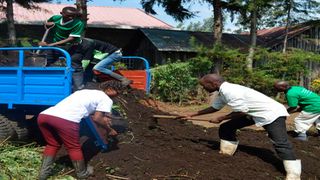
Members of Greencom Community make organic fertiliser in Mang’u, Nakuru County.
| Francis Mureithi | Nation Media GroupSeeds of Gold
Premium
Nakuru youth turning waste into organic fertiliser
Some 4km off the Nakuru-Eldoret Road in Mangu sub-location, Nakuru County, a blue tractor pulling a cart reverses and then stops.
The cart is full of what looks like sand but moving closer, one picks the whiff of animal manure. Soon, a group of youths, men and women, start to offload the manure.
Once the cart is empty, the youth then mix it with green leaves and sprinkle water on the mixture and then cover it with polythene materials.
"We first mix the animal manure that comes from chicken, pigs, cattle and sheep with plant waste. Thereafter, we add micro-organisms (bacteria) to speed up decomposition," Mildred Gachoka, the leader of the group named Greencom Community says.
“We buy the manure at Sh1,000 per tonne from farmers.”
A litre of the micro-organism is mixed with 20 litres of water before it is sprinkled on the manure.
“The microorganisms help to break down the waste, purify and kill pathogens. We further mix it with eggshells and wood ash and add calcium to speed up the decomposition process and neutralise acidity,” she offers, adding they established the venture with Sh200,000 seed capital.
Weighing scale
The money was used to buy a weighing scale, portable bag closer machine, sieving equipment, wheelbarrows, shovels and a stock of gunny bags and meet other overhead costs.
Once all the ingredients have been added, the organic fertiliser is then covered with polythene materials and left to stay for 21 days before it is turned to accelerate decomposition.
After 14 days, the process is repeated and later turned again after seven days for the last time.
"Thereafter, we sieve it until it’s fine and then add nutrients such as nitrogen, which we extract from plants. For nitrogen, we select indigenous plants like tithonia, ferment it with rabbit urine for 42 days and add."

Members of the Greencom Community with finished products in Nakuru.
The manure takes three months to be fully mature before it is dried and packed in 25kg and 50kg bags.
The group has leased an eighth-acre at Sh3,000 per month and divided it into two parts, one where they mix the manure, the rest where they have planted traditional vegetables.
"We started this venture in November 2015 and have employed 10 youths," says Gachoka, who learnt the art of making organic fertiliser from a training offered by World Vision.
The 11-member group produces a range of organic products that include foliar fertiliser and pesticides, which they brand Griincom.It has opened two fertiliser-making centres in Greensteds and Pipeline in Nakuru East as they expand their business.
They sell a 50kg bag of organic fertiliser at Sh1,500 to retailers and Sh1,300 to wholesalers while a 25kg bag goes for between Sh800 and Sh1,000, with the group selling up to 50 bags a month.
On the other hand, foliar fertiliser goes for Sh800 per litre while organic pesticide Sh650.
Gachoka says the fertiliser has nitrogen, phosphorus, potassium, calcium, zinc, iron, boron and magnesium.
Passion for agribusiness
Martin Mwaura, the group’s secretary, says they have been able to make good strides because members are committed. “Our members have a passion for agribusiness. We have no problem visiting markets in gumboots and farmers to collect the raw material,” says Mwaura.
To run the business, Gachoka says they paid Sh12,000 licence fee to the county government and there is also an annual fee of Sh50,000 one must pay the National Environment Management Authority for Environment Impact Assessment (EIA) certificate.
Dr Joseph Mafurah, an organic agriculture specialist from the Department of Crops, Horticulture and Soils, Egerton University, says making organic manure can be a money-minting business if practised well.
"For quality products, everything should be organic. They should not use any chemicals unless it is organically produced. The manure should be turned regularly to allow circulation of air and add water which is food for microorganism," he states.
Dr Mafurah notes organic fertilisers provide comprehensive nutrition to crops, promoting microbial breeding as they improve the soil’s physical and chemical properties and biological activities.





